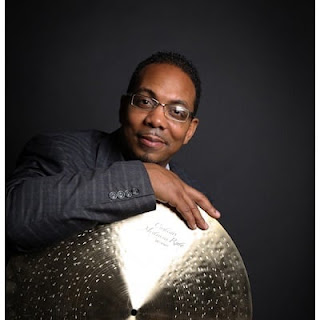Highly regarded Indianapolis drummer Kenny Phelps gets center stage as 'The Artisan'
 |
| Kenny Phelps: Symbol (of Indianapolis jazz) with cymbal |
As much as I've heard Kenny Phelps play drums around town since starting this blog eight-and-a-half years ago, I was amazed to discover after typing his name into my search window that 40 articles came up.
Nearly all of them were reviews of bands in which he was the drummer of choice. If I'd been even more active, and if this were exclusively a jazz blog, I'm sure the count would be higher. Of course, before May 2013, there were countless times when his contributions to Indianapolis jazz appeared under my byline in the Indianapolis Star.
So I was just as steeped in Phelps' music as many others who gathered at Madam C.J. Walker Theater Friday night to appreciate his response to a commission from the Indianapolis Jazz Foundation in a program called "Kenny Phelps presents...The Artisan."
His outreach to younger players through his "Beyond the Stage" program and leadership of the Owl Music Group was displayed in his inclusion of trumpeter Tyler Floe, drummer Dorian Phelps, trombonist Andrew Danforth, and guitarist Graham Helft. Dorian is the star's son, and, sitting behind his own kit next to Kenny, displayed his own style in an early number in the program. He has touches of his father's technique, a lot of energy, and a style that needs seasoning, but is already quite exciting.
The opportunity to focus on Kenny Phelps at center stage over nearly two hours brought home to me a new impression: He is incredibly relaxed. Unless my eyes and ears deceive me, he applies only as much energy as he needs. Whether he's playing loud or soft, the shoulders and upper arms don't move much. Everyone who's seen him is familiar with his metronomic head-bobbing, but that's another matter. What's producing all that sound proceeds from a calm center. Musicians of all styles — unless their genre or their chosen stage persona requires extra muscle involvement (not advisable for career longevity) — could learn a lot from him by observing his apparent freedom from tension. I think that enables the astonishing technique and musicianship to come forth so freely, relatively free of stress.
As musical director and a keyboardist and alto saxophonist of considerable fluency and drive, Hamilton Hardin of Columbus, Ohio, who was especially vital to projecting Phelps' love for and experience with church music. With three backup singers and Helft remaining onstage in the background, Hardin sang and played three originals, one of them based on Psalm 13, plus "Just Wanna Say" and "He Orders Every Step." Phelps's contentment in laying down a steady percussion background, with no jazz flourishes or attention-getting ornamentation, was evident throughout this part of the program as contemporary gospel took over. .
In between the showcase for the young people and the section starring Hardin came a set focused on Kenny Banks Jr., a 2019 finalist in the American Pianists Awards. The irrepressible pianist, both imaginative and rootsy in his approach, took the chief guest spot in three pieces. His cheekiness was matched by some of the Phelps' boldest, most varied and most responsive playing. "American Canvas," a typically broad exercise in jazz landscape painting, was succeeded by the whimsical "Balloon Tune," which yielded to the announced "Swing Low, Sweet Chariot," which came at the spiritual from a distant but charming angle.
The program fulfilled its purpose of presenting a musical autobiography of sorts, showcasing the drummer as an expert collaborator immersed in a variety of musical styles. Phelps' superior artisanship continues to be well-maintained, and his name will doubtless make many more appearances in this blog.



This comment has been removed by a blog administrator.
ReplyDelete